
Level Up Your Campus Life: Tips to Student Club Selection
When you start middle school, you're immediately introduced to hundreds of clubs established by your seniors. You are told how these clubs will enhance your learning beyond academics and enrich your campus life. We bet you’re wondering where to start! No worries. We’re here to guide you through the ins and outs of selecting the clubs that suit you best!
There is no absolute right or wrong answer when it comes to choosing clubs. However, it is worth noting that this decision may influence the persuasiveness of your college application. Hear us out. Clubs are a great opportunity for you to discover and cultivate your interests. If the club you choose is related to your intended field of study, your club experience can enhance your college application and increase your competitiveness. Below, we have organized some common clubs into different categories to help you put your best foot forward.

Students planning to pursue science and engineering fields, such as programming, physics, mathematics, chemistry, and robotics, should consider joining STEM-related clubs. Some common options include:
-
Science Competition Team
-
Math Mind
-
AMC Math Club
-
Chemistry Club
-
Biology Club
-
Invention Club
-
VEX Robotics
-
FIRST Robotics Competition
-
Code the Future with Artificial Intelligence
-
Electronics Club
-
Coding Club
Although these clubs are primarily designed for students interested in natural sciences or engineering, others passionate about these fields are still welcome to join. You can build your experiences through club activities such as schoolwide and external competitions, innovative projects, and research. These experiences will become valuable for your application essays, providing substantial and convincing details to your narrative. For example, when writing the UC essay prompt #6: "Think about an academic subject that inspires you. Describe how you have furthered this interest inside and/or outside of the classroom," you can mention both your course selections (inside of the classroom) and what you did/learned during club activities (outside of the classroom).

On the other hand, we encourage students interested in the humanities and social sciences, such as business, psychology, history, etc., to choose humanities and social science-related clubs. Common ones include:
-
National History Day Club
-
History Bowl
-
Psychology Club
-
Geography Club
-
Economics Competition Club
-
Business Investment Team
-
Entrepreneurship Club
These clubs allow you to explore your interests and expand your knowledge and passion for your chosen field. For example, consider the Common App essay prompt #6: "Describe a topic, idea, or concept you find so engaging that it makes you lose all track of time. Why does it captivate you? What or who do you turn to to learn more?" Let's say you joined the History Bowl club. You can participate in various team competitions and knowledge quizzes related to history. Through this process, you will learn something new and might discover your strong interest in certain historical events or periods. As you become more involved in this club, you might find yourself frequently absorbing history books, seeking guidance from your teachers or seniors, and becoming more active in club activities to strengthen your learning. This immersive learning experience can thereby transform into sincere and meaningful application essays.

Additionally, many students have outstanding leadership and communication skills. To bring their expressive abilities to the next level, students interested in making a positive impact through showcasing their talents can join clubs related to academic competitions, public speaking, media, and student organizations, as listed below:
Academic Competition
-
Academic Decathlon
-
World Scholar Cup
Public Speaking
-
Debate Club
-
Speech
-
Model United Nations
-
TEDx
Journalism
-
Broadcast Club
-
Newspaper + Literary Journal
-
School Magazine
-
Podcast Club
-
Reading Club
-
Yearbook Team
-
Graphic Novels Club
Leadership
-
Student Council
-
Student Association
-
Student House
Students can effectively develop their communication and adaptability skills by participating in the aforementioned clubs while collecting valuable materials for their application essays. For example, suppose you join your school's Model United Nations (MUN) club. In that case, you can polish your speaking and communication skills and cultivate your international outlook by exchanging perspectives with other delegates. When applying to colleges, you can share your proposals for addressing international issues in your essay to demonstrate your insights.

In addition to clubs that build your knowledge and skills, most schools also offer social service oriented clubs or organizations for students to engage in volunteer activities, such as beach clean-ups, teaching in underprivileged areas, blood donation drives, and more. Some common clubs include:
-
Interact Club
-
Rotary Club
-
Amnesty International
-
Red Cross
-
Key Club
-
SALT Kitchen
-
Pride Alliance
-
Taiwan Madhatter Knits
Participating in these clubs can make it easier for you to respond to UC essay prompt #7: "What have you done to make your school or your community a better place?" Such activities also help students accumulate volunteer experience. These experiences are particularly valuable for students applying to social work-related programs. With compelling stories of social contribution and extracurricular involvement, applicants to other fields can also showcase their impact on their communities.

In addition to academic clubs, there are many talent-oriented clubs, such as those related to the arts and sports. We sort art-related clubs into three main categories: Music, Performing Arts, and Fine Arts. Common clubs include:
Music
-
Orchestra
-
Rock Band
-
Violin Beginners
-
Guitar Club
-
Music Production Club
-
Pop Music Club
-
Acapella Club
-
Chinese Drumming
Performing Arts
-
Drama Club
-
Musical Club
-
Movie Production Club
-
Musical Set Design
-
Film Society
Fine Arts
-
Art Creation Club
-
Oil Painting Club
-
Photography Club
-
Architecture Club
-
Urban Design Club
-
Sketching 101
-
3D Art
-
Clay Club

In addition, most schools typically have sports and athletic clubs or clubs that cultivate students’ special interests. Based on our survey of several schools, here are some clubs that fall under these categories:
Athletic/Sports
-
Swimming Team
-
Golf Team
-
Fencing Team
-
Soccer Team
-
Tennis Team
-
Basketball Team
-
Badminton Team
-
Volleyball Team
-
Table Tennis Club
-
Taekwondo Club
-
Wushu Club
-
Boxing Club
-
Dance Team
-
Modern Dance
-
K-POP Dance
-
Ballet
-
Cheerleading Team
-
Cross Country Club
-
Trivia Club
-
Chess Team (Yes, chess is a sport)
Entertainment/Special Interests
-
Balloon Club
-
Cooking Club
-
Baking Club
-
Mahjong Club
-
Horse Riding
-
Rollerblading
-
Divination Club
-
Game Development 101
-
Flower Club
-
Needle Felting
-
Crochet and Crafts Creation
-
Green Thumb
When answering the UC essay prompt #3: "What would you say is your greatest talent or skill? How have you developed and demonstrated that talent over time?" you can use your experiences in the aforementioned clubs as the main content, describing interests and hobbies beyond extracurricular activities. For example, a student who joins the basketball team might define their talent as playing basketball and discuss how they joined the school team, participated in competitions, and even won an MVP award. You can showcase your achievements, abilities, and personality traits to impress the admissions officers by telling your story.

For those interested in language or cultural studies, you might consider clubs such as the Japanese Club, Chinese Club, Chinese Calligraphy, Korean Club, or Food Culture Club to learn more about new cultures and foster empathy and inclusivity.

This article is intended as a general guidance for you to choose the clubs that best align with your interests and goals. Sure, there might still be other clubs out there with unique philosophies and characteristics. Well, they'll be yours to explore!
閱讀中文版文章:校園生活加分Tips:學生挑選社團指南
Contact Us for High School Counseling & College Application Guidance
